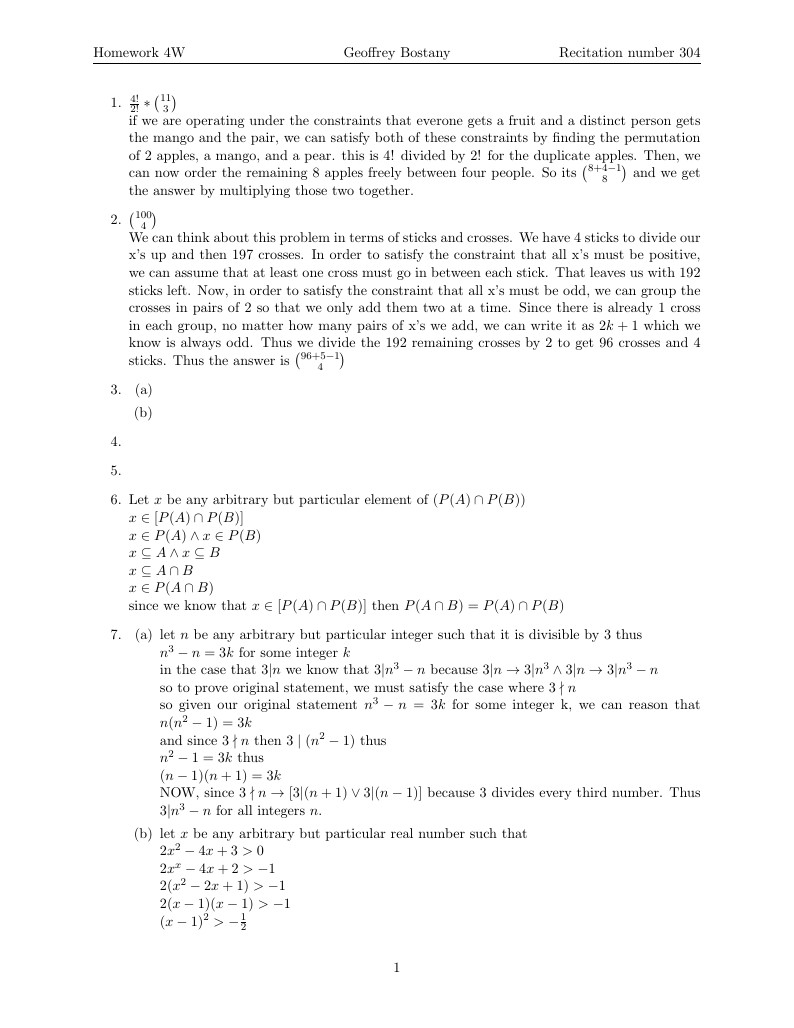
homework 4w
Author:
Geoffrey Bostany
Last Updated:
há 11 anos
License:
Creative Commons CC BY 4.0
Abstract:
homework 4w

\begin
Discover why over 25 million people worldwide trust Overleaf with their work.

\begin
Discover why over 25 million people worldwide trust Overleaf with their work.
\documentclass[11pt]{article}
\usepackage[margin=1in]{geometry}
\usepackage{fancyhdr}
\usepackage{amssymb}
\pagestyle{fancy}
\lhead{Homework 4W}
\chead{Geoffrey Bostany}
\rhead{Recitation number 304}
\begin{document}
\begin{enumerate}
\item $\frac{4!}{2!}* {11 \choose 3}$ \\ if we are operating under the constraints that everone gets a fruit and a distinct person gets the mango and the pair, we can satisfy both of these constraints by finding the permutation of 2 apples, a mango, and a pear. this is 4! divided by 2! for the duplicate apples. Then, we can now order the remaining 8 apples freely between four people. So its ${8+4-1 \choose 8}$ and we get the answer by multiplying those two together.
\item ${100 \choose 4}$ \\ We can think about this problem in terms of sticks and crosses. We have 4 sticks to divide our x's up and then 197 crosses. In order to satisfy the constraint that all x's must be positive, we can assume that at least one cross must go in between each stick. That leaves us with 192 sticks left. Now, in order to satisfy the constraint that all x's must be odd, we can group the crosses in pairs of 2 so that we only add them two at a time. Since there is already 1 cross in each group, no matter how many pairs of x's we add, we can write it as $2k+1$ which we know is always odd. Thus we divide the 192 remaining crosses by 2 to get 96 crosses and 4 sticks. Thus the answer is ${96+5-1 \choose 4}$
\item
\begin{enumerate}
\item
\item
\end{enumerate}
\item
\item
\item Let $x$ be any arbitrary but particular element of $(P(A) \cap P(B))$ \\ $x \in [P(A) \cap P(B)]$ \\ $x\in P(A) \wedge x\in P(B)$ \\ $x\subseteq A \wedge x \subseteq B$ \\ $x \subseteq A \cap B$ \\ $x\in P(A \cap B)$ \\ since we know that $x\in [P(A) \cap P(B)]$ then $P(A \cap B) = P(A) \cap P(B)$
\item
\begin{enumerate}
\item let $n$ be any arbitrary but particular integer such that it is divisible by 3 thus \\ $n^3-n=3k$ for some integer $k$ \\ in the case that $3|n$ we know that $3|n^3-n$ because $3|n \to 3|n^3 \wedge 3|n \to 3|n^3-n$ \\ so to prove original statement, we must satisfy the case where $3 \nmid n$ \\ so given our original statement $n^3-n=3k$ for some integer k, we can reason that $n(n^2-1)=3k$ \\ and since $3 \nmid n$ then $3 \mid (n^2-1)$ thus \\ $n^2-1=3k$ thus\\ $(n-1)(n+1)=3k$ \\ NOW, since $3 \nmid n \to [3|(n+1) \vee 3|(n-1)]$ because 3 divides every third number. Thus $3|n^3-n$ for all integers $n$.
\item let $x$ be any arbitrary but particular real number such that \\ $2x^2-4x+3>0$\\ $2x^x-4x+2>-1$ \\ $2(x^2-2x+1)>-1$ \\ $2(x-1)(x-1)>-1$ \\ $(x-1)^2>-\frac{1}{2}$ \\ for any integer $k$, $k^2$ will never be negative so if $k=(x-1)$, then $k^2$ will never be negative \\ thus $(x-1)^2>-\frac{1}{2}$ thus proving the original statement.
\end{enumerate}
\end{enumerate}
\end{document}